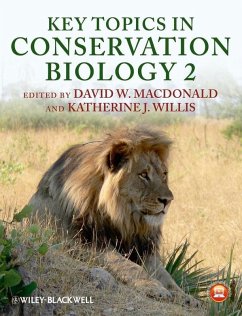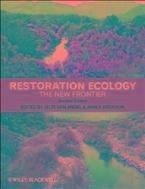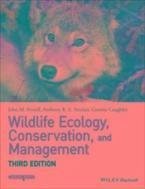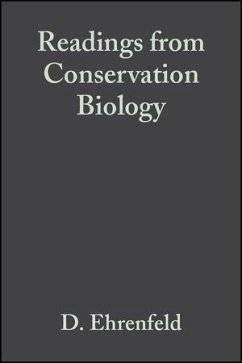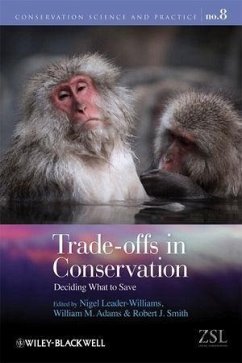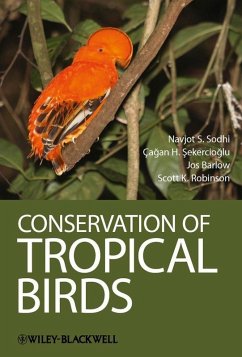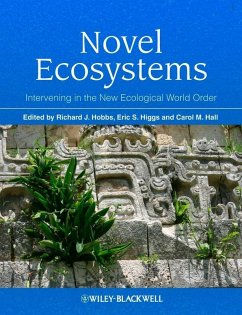
Key Topics in Conservation Biology 2 (eBook, PDF)
Versandkostenfrei!
Sofort per Download lieferbar
62,99 €
inkl. MwSt.
Weitere Ausgaben:

PAYBACK Punkte
0 °P sammeln!
Following the much acclaimed success of the first volume of Key Topics in Conservation Biology, this entirely new second volume addresses an innovative array of key topics in contemporary conservation biology. Written by an internationally renowned team of authors, Key Topics in Conservation Biology 2 adds to the still topical foundations laid in the first volume (published in 2007) by exploring a further 25 cutting-edge issues in modern biodiversity conservation, including controversial subjects such as setting conservation priorities, balancing the focus on species and ecosystems, and financ...
Following the much acclaimed success of the first volume of Key Topics in Conservation Biology, this entirely new second volume addresses an innovative array of key topics in contemporary conservation biology. Written by an internationally renowned team of authors, Key Topics in Conservation Biology 2 adds to the still topical foundations laid in the first volume (published in 2007) by exploring a further 25 cutting-edge issues in modern biodiversity conservation, including controversial subjects such as setting conservation priorities, balancing the focus on species and ecosystems, and financial mechanisms to value biodiversity and pay for its conservation. Other chapters, setting the framework for conservation, address the sociology and philosophy of peoples' relation with Nature and its impact on health, and such challenging practical issues as wildlife trade and conflict between people and carnivores. As a new development, this second volume of Key Topics includes chapters on major ecosystems, such as forests, islands and both fresh and marine waters, along with case studies of the conservation of major taxa: plants, butterflies, birds and mammals. A further selection of topics consider how to safeguard the future through monitoring, reserve planning, corridors and connectivity, together with approaches to reintroduction and re-wilding, along with managing wildlife disease. A final chapter, by the editors, synthesises thinking on the relationship between biodiversity conservation and human development.
Each topic is explored by a team of top international experts, assembled to bring their own cross-cutting knowledge to a penetrating synthesis of the issues from both theoretical and practical perspectives.
The interdisciplinary nature of biodiversity conservation is reflected throughout the book. Each essay examines the fundamental principles of the topic, the methodologies involved and, crucially, the human dimension. In this way, Key Topics in Conservation Biology 2, like its sister volume, Key Topics in Conservation Biology, embraces issues from cutting-edge ecological science to policy, environmental economics, governance, ethics, and the practical issues of implementation.
Key Topics in Conservation Biology 2 will, like its sister volume, be a valuable resource in universities and colleges, government departments, and conservation agencies. It is aimed particularly at senior undergraduate and graduate students in conservation biology and wildlife management and wider ecological and environmental subjects, and those taking Masters degrees in any field relevant to conservation and the environment. Conservation practitioners, policy-makers, and the wider general public eager to understand more about important environmental issues will also find this book invaluable.
Each topic is explored by a team of top international experts, assembled to bring their own cross-cutting knowledge to a penetrating synthesis of the issues from both theoretical and practical perspectives.
The interdisciplinary nature of biodiversity conservation is reflected throughout the book. Each essay examines the fundamental principles of the topic, the methodologies involved and, crucially, the human dimension. In this way, Key Topics in Conservation Biology 2, like its sister volume, Key Topics in Conservation Biology, embraces issues from cutting-edge ecological science to policy, environmental economics, governance, ethics, and the practical issues of implementation.
Key Topics in Conservation Biology 2 will, like its sister volume, be a valuable resource in universities and colleges, government departments, and conservation agencies. It is aimed particularly at senior undergraduate and graduate students in conservation biology and wildlife management and wider ecological and environmental subjects, and those taking Masters degrees in any field relevant to conservation and the environment. Conservation practitioners, policy-makers, and the wider general public eager to understand more about important environmental issues will also find this book invaluable.
Dieser Download kann aus rechtlichen Gründen nur mit Rechnungsadresse in D ausgeliefert werden.



